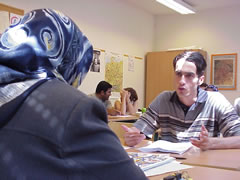PROJECT INFO

CHAGAL - “Is that the artist you are talking about?”
“No, I am referring to the ‘CHAGAL curriculum guidelines’
which have been developed to improve the situation of international students
at European universities.”
The CHAGAL project is based upon the hypothesis
that international students enrich European universities. Their knowledge
and linguistic richness enable universities to evolve both on a multilingual
and an intercultural level.
The acronym “CHAGAL” corresponds to the project title “Curriculum
Guidelines for access programmes into higher education for underrepresented
adult learners”.
C CURRICULUM
H Higher Education
A Access Programmes
G GUIDELINES
A for Underrepresented Adult
L Learners
 The
document
“Curriculum Guidelines”, which has been translated into 8
languages, includes, in a summarised form, 12
principles for curriculum building. These guidelines are the result of
a process, which was initiated in 2002, launched with the support of the European
Commission programme “GRUNDTVIG 1”.
The
document
“Curriculum Guidelines”, which has been translated into 8
languages, includes, in a summarised form, 12
principles for curriculum building. These guidelines are the result of
a process, which was initiated in 2002, launched with the support of the European
Commission programme “GRUNDTVIG 1”.
CHAGAL focuses on two main objectives:
- supporting international students entering university
- disseminating the “learner-centred approach”
Initially, CHAGAL targeted groups of students who were either from developing countries, members of ethnic minorities or refugees. The “learner-centred approach” evolved through the project, which no longer focuses only on students from the aforementioned groups, but has also extended to other learning contexts.
Putting the “CHAGAL Curriculum Guidelines” into practice
Within the framework of the ECML’s 2nd medium term programme, the project CHAGAL- Set Up principally aimed to collect examples of “good practice”. There were two sources for the compilation of such examples:
- The outcomes of the field testing phase of the GRUNDTVIG 1 project.
The examples, called “pilot projects”, concern the implementation of the “Curriculum Guidelines” within European institutions open to foreign students. - The outcomes of the Central Workshop held in April 2005. Around thirty experts from over twenty European countries met at the ECML in Graz, Austria. By focussing on their specific projects, the participants described how they had been able to put the “Curriculum Guidelines” into practice in their institutions.